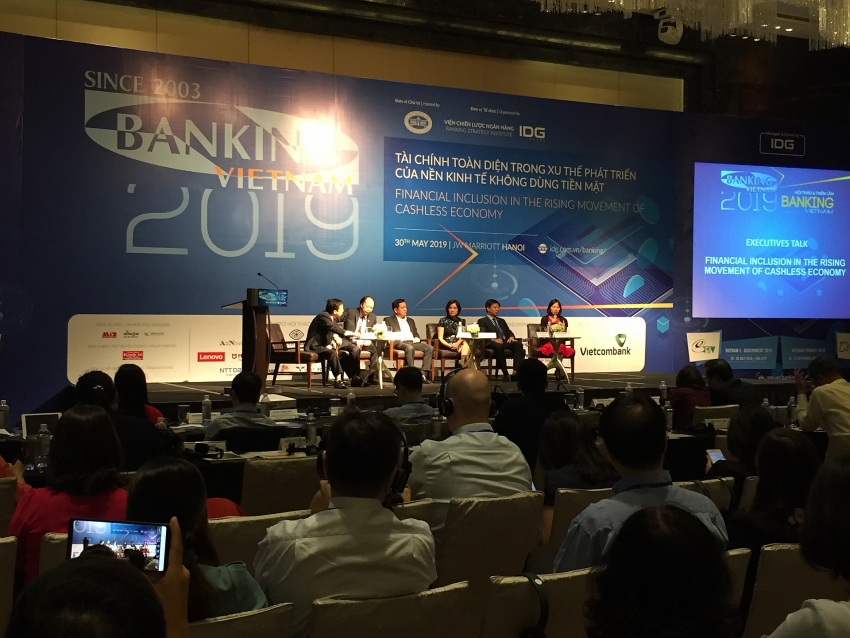Banking Vietnam 2019: comprehensive finance in a cashless economy
 |
| Vietnam Banking 2019 offered crucial insights into cybersecurity in a cashless economy |
This year's event took place in the context that the banking sector is promoting the comprehensive finance and non-cash payment with the aim to finish the project on development non-cash payment in the period of 2016-2020.
Addressing the conference, Nguyen Thi Hien, vice head of the Banking Strategic Institute of the State Bank of Vietnam (SBV), in 2018, the Vietnamese finance sector saw a successful rise in e-payment as internet and mobile payments grew by 19.5 and 169 per cent in terms of transaction value. “PwC listed Vietnam among the countries with the highest growth of mobile payment in 2018,” he added.
According to the statistics of the SBV, in the first quarter of 2019, the interbank electric payment system has handled 37,325 transactions with the value of VND20,691 trillion ($899.6 billion), an increase of 22.99 per cent in quantity and 18.82 per cent in value compared to the same period in 2018. In the whole country, there are 18,668 ATM and 261,705 point-of-sale (POS) devices. The number and value of transactions using domestic banking cards continue rising, reaching 65 million transactions for VND171 trillion. The number and value of financial transactions through internet platforms increased by 68.8 and 13.4 per cent compared to the same period in 2018, while the figures for mobile platforms are 97.7 and 232.3 per cent. About 50 commercial banks have connected to the electric tax payment system of the General Department of Taxation.
According to Hoang Minh Tien, deputy director of the Information Security Department under the Ministry of Information and Communications, digital transformation in the banking and finance sector has brought many potential security risks along with cashless payment options for people on mobile and internet platforms. “However, the change hides due to increasingly sophisticated and complex attacks, causing more and more serious economic damages as well as loss of face for financial institutions,” he said.
From the survey results of 30 commercial banks and joint stock commercial companies and 16 financial service providers in Vietnam, Nguyen Trong Duong, director of the Vietnam Computer Emergency Response Team (VNCERT), a government cybersecurity co-ordination centre under the MIC, said the main types of attacks that financial enterprises cope with are malware (50 per cent), fake emails (46 per cent), and spyware (23 per cent).
The most important security issue is data leaking (60 per cent), while external attacks account for 40 per cent ofthe total.Therefore, he suggested, “One of the top priority security tasks in 2019 is to prevent data loss through network connection and IT system protection before attacks.” Duong also emphasised the importance of co-operation with foreign cybersecurity providers and application of international standards of cybersecurity.
Meanwhile, Nguyen Thuy Duong, deputy general director of Ernst & Young Vietnam (EY), said that there are four elements to ensure security in cashless payment, including technology, human, financial capability, and policies. “A recent report of EY showed that every 30 days, there is a new technology introduced in the world and it takes the same time for the technology to reach 1.5 million users,” she said.
She thinks that Vietnam, like the world, has been applying technologies well in the finance sector, and the challenges come from the other three elements, but the most important thing is policies. “We have joined the WTO, we need to open the doors and accept the game. However, without legitimate protection and suitable rules, there will be disadvantages to users,” she said. “The State Bank should have a centre to study policies to ensure the rights of people and banks during the development of the economy.”
According to Alwaleed Alaabani, head specialist on finance of the World Bank in Vietnam, the country has potential for fintech startups with a lot of talents. “The private sector and the Vietnamese government should co-operate with each other and discuss to identify risks and give out solutions,” he told VIR.
Nguyen Dinh Thang, chairman of Lien Viet Commercial Joint Stock Bank (LienVietPostBank), suggested that the SBV should have a policy to develop a 24/7 agent system which is convenient for customers even at midnight and in rural areas, allowing them to deposit and withdraw money whenever they need.
Meanwhile, Nguyen Kim Anh, Deputy Governor of the SBV, said, “In order to promote comprehensive financing and develop electronic payments, we should pay attention to digitalising banking services, while placing customers in the centre of the services.”
What the stars mean:
★ Poor ★ ★ Promising ★★★ Good ★★★★ Very good ★★★★★ Exceptional
Related Contents
Latest News
More News
- Citi sharpens its focus on institutional banking (February 09, 2026 | 19:58)
- SSC steps up engagement with FTSE Russell on market reforms (February 09, 2026 | 17:33)
- IFC considers $50m trade finance guarantee facility for Nam A Bank (February 09, 2026 | 17:28)
- Hoa Phat Agricultural Development debuts shares on HSX (February 06, 2026 | 14:00)
- Vietcap’s VAD 2026 draws strong global investor turnout (February 06, 2026 | 13:30)
- New rules ease foreign access to Vietnam equities (February 05, 2026 | 17:29)
- 0.1 per cent tax proposed on each transfer of digital assets (February 05, 2026 | 17:27)
- Ministry of Finance tightens policy delivery at start of year (February 05, 2026 | 17:26)
- Vietnam steps up market reforms as FTSE Russell reviews upgrade progress (February 05, 2026 | 17:20)
- 2025 profits mixed amid strong energy and farming results (February 05, 2026 | 17:18)

 Tag:
Tag:
























 Mobile Version
Mobile Version